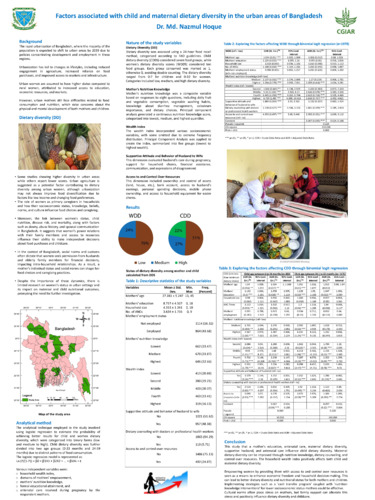Influence of women’s empowerment on maternal and child dietary diversity in urban Bangladesh
Abstract
Consumption of diverse diets has been associated with improved maternal health and child growth. Diverse diets are a proxy for micronutrient adequacy. The nutritional effects of women’s empowerment on women and children are understudied, especially in urban locations. Hence, this study has been conducted on the status of maternal and child nutrition, understanding how it relates to various dimensions of women’s empowerment in urban settings. A sample of 1978 mother–child pairs in different cities of Bangladesh revealed that more than 75% of the mothers and 50% the children had low dietary diversity. The wealth holdings and access to resources by the women were found unsatisfactory, while 66% had the lowest to medium level of nutritional knowledge due to a lack of dietary counselling. Multivariate logistic regression indicated that child dietary diversity was influenced by the mother’s education, antenatal care, maternal dietary diversity, supportive attitude and behavior of husbands, and antenatal care. While the household wealth index can enhance both the child’s and mother’s dietary variety, nutrition education, dietary counselling, and access to and control over resources can all improve maternal dietary diversity. This study recommends improving women’s socioeconomic status by increasing their wealth and access to resources, including providing food and nutrition counselling for higher nutrition knowledge.

